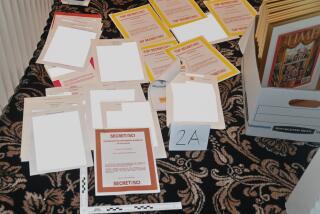U.N. Arms Inspectors Find Little at Baghdad Ministry
- Share via
MANAMA, Bahrain — After sifting through thousands of documents and scouring scores of rooms, drawers, cabinets and cupboards, U.N. weapons inspectors emerged from their intensive two-day search of Baghdad’s Agriculture Ministry complex Wednesday with little more than the notebooks they carried in and an Iraqi promise of “a new chapter” in the United Nations’ long-frustrated effort to destroy Iraq’s massive arms program.
Returning to Bahrain after the largely symbolic search, the inspection team tried to put the best face on the outcome, declaring that the mission had yielded “new facts” that may help them trace a store of documents that they suspect Iraqi authorities removed from the building during the three-week standoff that again brought the U.S. military to the brink of war with Iraq.
Rolf Ekeus, chairman of the special U.N. commission authorized to find and dispose of Iraq’s weapons of mass destruction, declared the search “a great triumph for the U.N.” He added that he was neither disappointed nor surprised that the seven-story ministry building yielded no documents “directly related” to the nuclear, chemical and ballistic weapons outlawed under last year’s cease-fire resolution that ended the Persian Gulf War.
After arriving at his commission’s field headquarters here late Wednesday, Ekeus told reporters that his team of experts had targeted the ministry building because of reliable reports that it housed records Iraq could use to recreate a long-range ballistic missile system after the U.N.-mandated destruction of Iraq’s missile arsenal.
Asked for specifics, Ekeus responded that “the minister of agriculture has, or had, links to certain components of Iraq’s weapons program.” He added that “one serious, outstanding problem with Iraq is the matter of foreign suppliers to the Iraqi weapons program--especially to the missile program. Iraq is not cooperating there.”
Conceding that the two-day search yielded no “material of direct relevance” to Iraq’s weapons program, the Swedish chairman stressed that the hunt for documents is far from finished.
“They can’t burn them up,” he said, indicating that Iraq would need such blueprints to reconstruct its ambitious missile program. “They have to keep them somewhere.”
The commission chairman, tieless and tired after two days of intensive meetings with senior Iraqi officials, indicated that he was encouraged by a newfound tone of cooperation from Baghdad’s intransigent leadership during the group’s visit.
Neither Ekeus nor Achim Biermann, the German arms expert who led the team of six inspectors and three U.N. translators into the building and its annex, would concede that the mission had been a waste of time.
“We did a thorough investigation, and we have to go through all our notes,” Biermann said. “It’s just the normal way how to conduct the operation. You get a target. You plan for it. You hit it. You do it very carefully and thoroughly and, even if there are not directly related items or weapons, you have something that you have to assess.”
Without giving specifics, Biermann indicated that the U.N. arms detectives will be comparing their notes in search of a paper trail or any other hidden clues that could yet lead them to substantive documents.
On the political front, Ekeus said he was very encouraged by his lengthy discussions with members of Iraqi President Saddam Hussein’s Cabinet and his ruling party leadership, talks that Ekeus said focused on the question, “How shall we go from here?”
Contrary to the public image of defiant celebration depicted on state-run Iraqi television--which repeatedly broadcast footage of a serene and smiling Hussein swimming in the Tigris River among a dozen life-jacketed bodyguards and later standing atop an armored car waving to an adoring crowd--Ekeus said the mood of the Iraqi leaders left him with the sense that Wednesday’s developments “have been a great triumph for the United Nations.”
“The deputy prime minister said, and I quote, ‘On Monday, we start a new chapter . . . of full cooperation’ ” with the United Nations, Ekeus said. Asked his reaction to the televised images of Iraqi jubilation, Ekeus smiled and said, “I’m happy they’re celebrating cooperation with the U.N.” And he added that this week’s search of the ministry “is an important step--a demonstration to Iraq that it cannot stall. It must cooperate.”
And in defending his decision to compromise with the Iraqis last weekend by proposing a weapons team that excluded Americans, the chairman insisted that it was Iraq that “had to cave in. . . . Iraq had absolutely refused to give us access to the building.”
More to Read
Sign up for Essential California
The most important California stories and recommendations in your inbox every morning.
You may occasionally receive promotional content from the Los Angeles Times.













